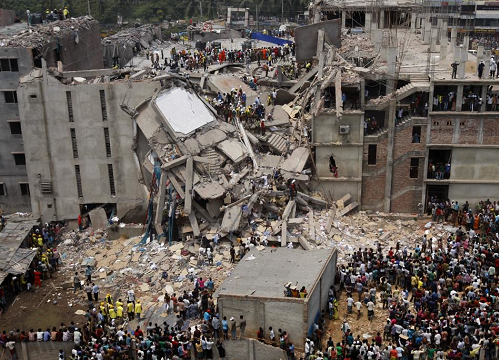10 Years Later: The Legacy of Rana Plaza
We mourn and honor the more than 1,100 workers killed and the thousands more injured when the Rana Plaza building in Dhaka, Bangladesh, collapsed on April 24, 2013. Six of the eight floors of the building housed factories producing garments for major international brands.
Workers expressed concerns that the building was structurally unsafe the very morning of the accident due to visible cracks. Yet managers forced workers to enter the building and report to their workstations, threatening dismissal and retaliation if they refused. Shortly before the collapse, several of the factories had received a clean bill of health from inspection audits conducted by several global brands. The Rana Plaza tragedy raised serious concerns over the ability of the voluntary corporate social responsibility and social auditing compliance model to deliver on labor rights and decent work in the global garment industry.
The resulting public pressure led 220 global apparel companies to sign the Accord on Fire and Building Safety in Bangladesh with global and Bangladeshi unions in May 2013.
The accord was unprecedented: it was legally binding and enforceable and equally led by unions and global companies. It created an independent entity to implement the agreement and obligated brands to ensure their supplier factories fully complied with provisions on worker safety and rights.
The accord provided a new model for rights compliance: worker-driven social responsibility. Other initiatives have since applied this model. These include the Dindigul agreement in India and the Lesotho agreement, both designed to end gender-based violence and harassment of garment factory workers.
These worker-driven agreements are binding and enforceable. Unions and companies negotiate these agreements and share governance and implementation responsibilities. Credible complaint mechanisms protect workers from retaliation and provide access to remedy.
As we reflect on the 10 years since the Rana Plaza collapse, we acknowledge the significant progress made – but there is so much more to be done.
Serious safety hazards persist in too many factories. Workers still face obstacles and reprisals when they try to form independent and democratic unions. Their fundamental rights are routinely violated without consequence. Safety gains are not sustainable in an environment where workers commonly face violence, threats, and retaliation for trying to form unions. Worker safety remains at risk in an environment where major international brands resist paying a fair price to suppliers.
At the U.S. Department of Labor, we are committed to helping expand worker-driven social responsibility to protect the most vulnerable workers in other industries and sectors – and to work with all stakeholders to effect lasting change. Governments must develop stronger labor protections and enforce them, with adequate personnel and resources. Suppliers must keep their workplaces safe and ensure workers and their unions are able to freely associate. They also must engage in good faith with those unions wishing to collectively bargain. International brands and buyers must demand that labor rights are respected throughout their supply chains, including through purchasing and pricing practices that support decent work, living wages and high labor standards. Finally, workers and their unions must have a voice in the implementation, monitoring and enforcement of emerging legally binding initiatives.
This administration believes that workers’ rights are best protected and their interests best represented when they are able to freely form and join unions. And protecting workers’ freedom of association and right to bargain collectively is an essential part of eliminating human rights violations in global supply chains.
Ten years later, let us honor the memory of the workers who lost their lives at Rana Plaza by boldly working toward a fair, transparent and sustainable garment industry. And let us collectively build an industry where legally binding agreements, strong regulations and accountability among all stakeholders – governments, international brands, suppliers and unions – are considered the norm, rather than the exception.
Thea Mei Lee is the deputy undersecretary for international affairs. Follow ILAB on Twitter at @ILAB_DOL.
Koebel.Tiffany…
Thu, 04/20/2023 – 13:46


Comments are closed.